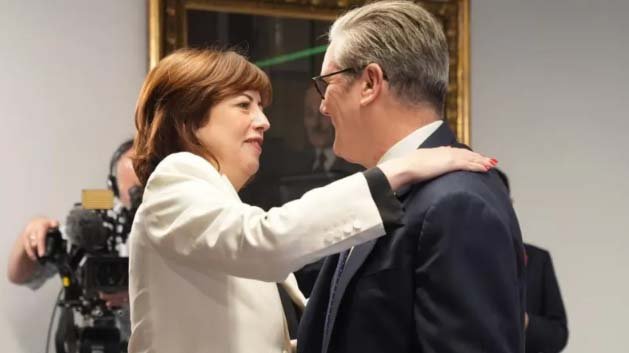
Lucy Powell has been elected as Labour’s new deputy leader after a race triggered by Angela Rayner’s resignation last month.
The Manchester Central MP defeated Education Secretary Bridget Phillipson by promising to give grassroots members a louder voice and push for a “course correction” in government.
She was sacked from the cabinet in September and drew support from members who are dissatisfied with the direction of the government under Sir Keir Starmer’s leadership.
Powell took 87,407 votes, nearly 14,000 votes ahead of Phillipson, on a turnout of 16.6%.
During her victory speech she said the party needed to be “bolder” and promised to be a “champion for our Labour values”.
She said she would “help Keir and our government to succeed” but said the party “must change how we are doing things to turn things around”.
Powell said she would use her role to “bring voices” who believe the government is not being bold enough “to the heart of our party”.
“I’ll be a champion for our Labour values and boldness in everything we do, and I know that you Keir, as our leader, want that – and I will be your ally in that fight,” she said.
Powell also singled out Reform UK, saying it “starts with us wrestling back the political megaphone and setting the agenda more strongly, because let’s be honest we’ve let [Nigel] Farage and his ilk run away with it”.
She said the party could not win support by “trying to ‘out-Reform’ Reform”.
Powell’s victory comes after a week in which the government has faced questions over the grooming gangs inquiry and the mistaken release of a migrant sex offender from prison.
It also saw Labour beaten in a Senedd by-election in Caerphilly, a seat the party had held for a century.
The prime minister said he accepted the party had suffered a “bad result” in Wales, describing it as a “reminder that people need to look out their window and see change and renewal in their community, opportunities for their children, public services rebuilt, the cost of living crisis tackled”.
Labour must now “unite” and “keep our focus on what is, in my view, the defining battle for the soul of our nation”, he added.
Phillipson congratulated Powell on her victory in a statement, though said she was “obviously disappointed at today’s result”.
She said it was “crucial that our party now comes together to take the fight to Reform in next year’s crucial Senedd, Holyrood and local elections”.
The race to be Labour deputy leader began with six candidates but the field was quickly reduced to two, with Phillipson widely seen as the leadership’s preferred candidate.
The education secretary gained an early lead when the election campaign first got under way, securing more MPs and union endorsements, but Powell gained ground by winning support from constituency parties.
She was endorsed by figures who have been publicly critical of the Labour leadership, like Mayor of Greater Manchester Andy Burnham.
Powell and Phillipson served in cabinet together and are seen as being close politically – but while the race was largely collegiate, it erupted at points into accusations of “mud-slinging” and sexist briefings.
Hustings at Labour’s conference highlighted a divide in approach: Phillipson warned against “division and disunity”, while Powell insisted Labour leaders needed to listen to a wider range of voices to avoid political missteps.
In June, the government was forced into a U-turn over cuts to welfare spending, which Powell blamed on the failure of Starmer’s team to listen to MPs.
During the campaign, Powell frequently referred to “mistakes” made by the party on issues such as the winter fuel allowance.
Powell’s victory was widely expected but while a winning margin of 54% to 46% was clear, it was not overwhelming, suggesting Labour members have not entirely rejected Sir Keir’s leadership.
The low 16.6% turnout is also stark, but without a breakdown of membership it’s hard to draw conclusions.
That is partly because while many people join Labour individually, some are eligible to vote via their trade union membership, and may not be engaged with internal party races.
The union Unite declared that neither candidate was worthy of support so it would be unsurprising if some of their members sat on their hands.
The election was triggered by Rayner’s dramatic resignation after admitting to underpaying tax on a house purchase.
While relations between Sir Keir and Rayner had been tense at times, she was seen as a key figure in government.
She held the title deputy prime minister and was seen as a political bridge between the leadership and the party’s traditional working class and union base.
But last month’s reshuffle left the deputy leadership as a purely party role after Sir Keir appointed David Lammy as deputy prime minister and placed key allies in other cabinet roles.
However, Powell will sit on Labour’s powerful National Executive Committee and act as the party’s “campaigner-in-chief.”
Previous holders of the role have sought to unite the party’s factions but differences of opinion with leaders have also led to divisions.
Under Sir Tony Blair, John Prescott became a link to Labour’s party faithful and the pair had a close relationship – while Tom Watson, on the other hand, clashed with Jeremy Corbyn.
Whether Powell’s election strengthens Labour’s campaign machine or deepens internal strains could shape the party’s fortunes over a critical few months for the party.
Chancellor Rachel Reeves is weeks away from delivering a much-anticipated Budget, where she is expected to raise taxes.
The party is also only six months away from a difficult set of council elections in England, and elections in Scotland and Wales, where Powell will play a key role in rallying activists.
 Weekly Bangla Mirror | Bangla Mirror, Bangladeshi news in UK, bangla mirror news
Weekly Bangla Mirror | Bangla Mirror, Bangladeshi news in UK, bangla mirror news







